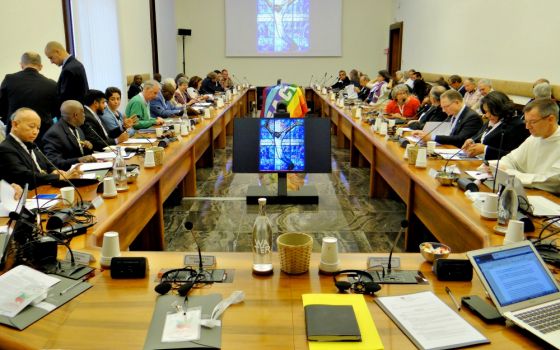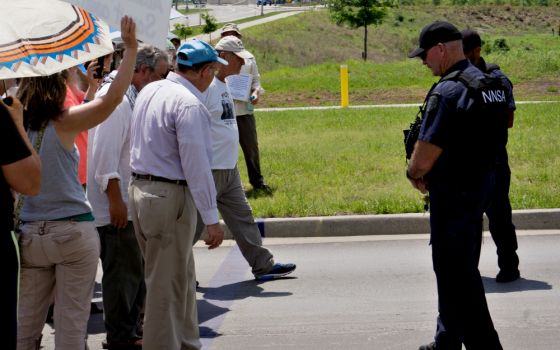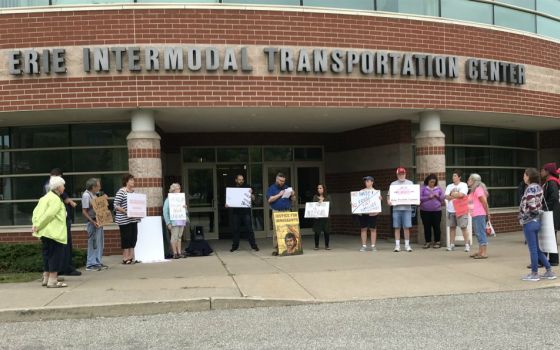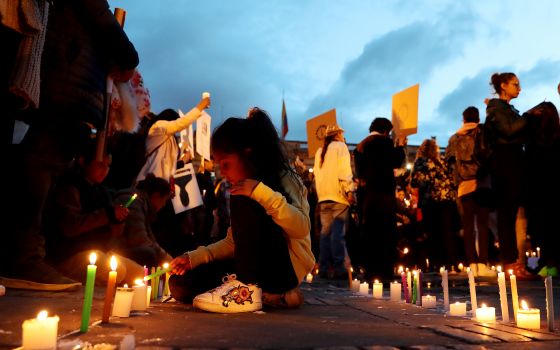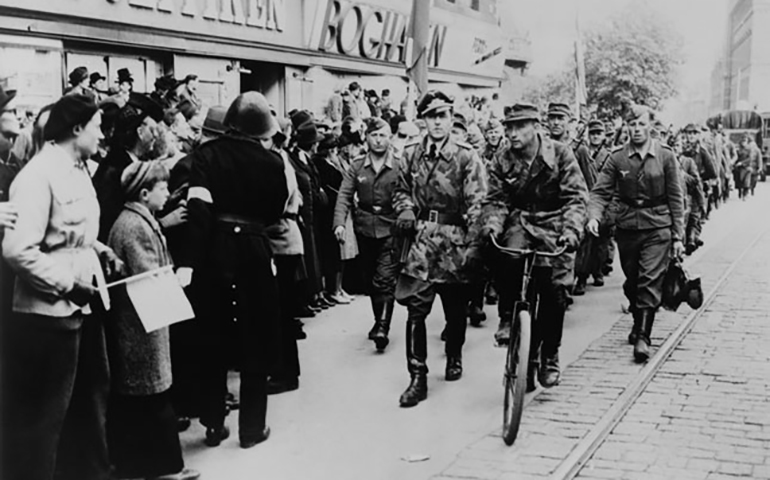
Nazi soldiers march down a commercial street in German-occupied Denmark in 1945. Denmark was one of the last occupied countries to be cleared of Germans, waiting until May 5, 1945, for liberation by the British army. (Newscom/Everett Collection)
After an April meeting on nonviolence, sponsored by the Pontifical Council for Justice and Peace and Pax Christi International, attendees issued a statement titled "An Appeal to the Catholic Church to Re-Commit to the Centrality of Gospel Nonviolence," which rightly acknowledges the dangers of misguided use of "just war" language. But, in calling for jettisoning that tradition, the statement endangers the just peace it hopes to promote.
The U.S. bishops' pastoral letter of 1983, "The Challenge of Peace: God's Promise and Our Response," embraces a hopeful but realistic eschatology (the kingdom of God is "already but not yet," inaugurated but not fulfilled) and takes nonviolence seriously in that context. It teaches a strict interpretation of the just war tradition, of the right of nations to defend themselves, and places a high responsibility on personal conscience, endorsing pacifism, but also selective conscientious objection, the right of soldiers to refuse participation in wars judged unjust.
I find the richness of this perspective missing from the recent appeal.
No Catholic should take exception to the appeal's call "for our Church to be a living witness and to invest far greater human and financial resources in promoting a spirituality and practice of active nonviolence and in forming and training our Catholic communities in effective nonviolent practices." If even a minority of Catholics were to take up this challenge, it would make a difference.
I must, however, take exception to this stated belief: "There is no 'just war.' Too often, the 'just war theory' has been used to endorse rather than prevent or limit war. Suggesting that a 'just war' is possible also undermines the moral imperative to develop tools and capacities for nonviolent transformation of conflict."
The obvious example is the Allied war against the Axis powers in the 1940s. Certainly, Hitler's wars were not just, so to oppose them militarily, since no other effective means were available, was eminently just.
The Allied bombing of German and Japanese cities, even apart from atomic bombing, was, to cite the Second Vatican Council, "a crime against God and man himself" and "merits unequivocal and unhesitating condemnation." But defeating Hitler's racist, totalitarian imperialism by discriminate and proportionate means was a high moral imperative.
Do the authors of the conference statement believe that this could have been done nonviolently? Do they think such a threat could never arise again?
No doubt just war theory has been used improperly, even cynically. That all wars are unjust on at least one side does not mean that all sides in all wars are unjust. And maintaining that war can be undertaken as a last resort does not necessarily detract from the imperative to avoid war whenever possible, and to develop means to do so effectively.
But it is the recommendation of the conference statement that the Catholic church "no longer use or teach 'just war theory.' " So how will the church evaluate future wars? Even pacifists have to make an argument if they want to be taken seriously in public debate, and condemning all wars is not likely to get traction when innocent citizens are under attack.
There are other weaknesses in the document, especially its treatment of the Bible. First, the New Testament does not require jettisoning the just war tradition that arose in post-biblical times. While the teaching of Jesus does not explicitly provide a warrant for using force to defend neighbors against attack, neither does it prohibit using force when other means are lacking. Love of enemies is not necessarily incompatible with participation in just war. On the other hand, refusal to defend the innocent, by force if necessary, may be incompatible with agape.
Second, Jesus' self-sacrifice does not require abandoning just war. His example of not using force to defend himself (a bilateral situation) does not tell us what he would have done if he came across an aggressor attacking an innocent victim (a multilateral situation).
What would the good Samaritan have done had he arrived during the beating, not after? What if all nonviolent attempts at intervention failed? What if coming between the aggressor and the victim would have led to two deaths instead of one? At what point does the commitment to nonviolence become complicity in violence?
Jesus defended the woman caught in adultery with wit, word and gesture, but what if the mob had not responded as it did? Could Jesus have prevented her death by his self-sacrifice?
Beyond scriptural concerns, I would argue that the prevention of unjust war is the most pressing issue, and that abandoning the just war tradition would harm the cause. What if citizens refused to support unjust wars and members of the military refused to fight them? Is that more likely to happen because of widespread conversion to pacifism or because citizens and soldiers learn to take the just war tradition seriously?
The conference statement points to successful nonviolent campaigns as suggesting a credible alternative to opposing injustice militarily. Nonviolence has indeed had triumphs in combating tyranny in the 20th century, but few if any are examples of stopping international aggression. The Danes resisted Hitler non-militarily, but they did not defeat him. The Allied militaries did that.
The U.S. bishops got it right in 1983: We should simultaneously develop strategies of nonviolence and hold to a strict understanding of when war can be justified, and when it cannot — but we should not jettison the tradition until it is genuinely obsolete.
Pope John Paul II and the U.S. bishops denounced the 2003 invasion of Iraq before it began. Was the problem the tradition, or was it the reluctance of Catholic citizens and soldiers to abide by it? Uncritical social conformity, patriotism and obedience to authority are the problem, not the just war tradition itself.
I applaud the call for Pope Francis to issue a deeply researched encyclical on these matters. He could do worse than modeling such a teaching on "The Challenge of Peace."
[Roger Bergman, director of justice and peace studies at Creighton University, is working on a book on selective conscientious objection.]
